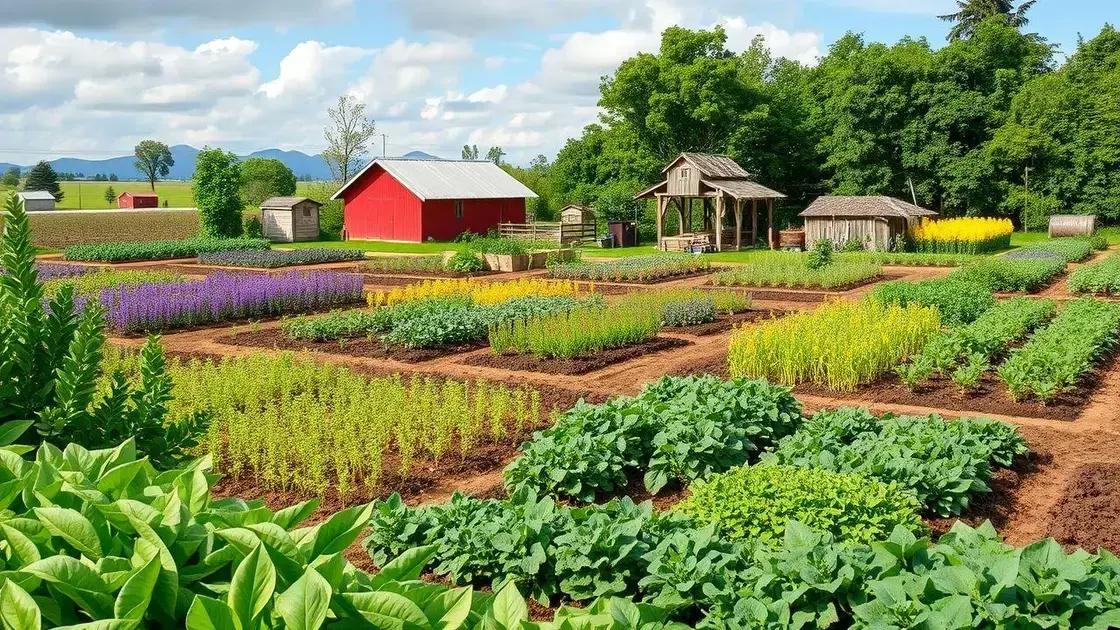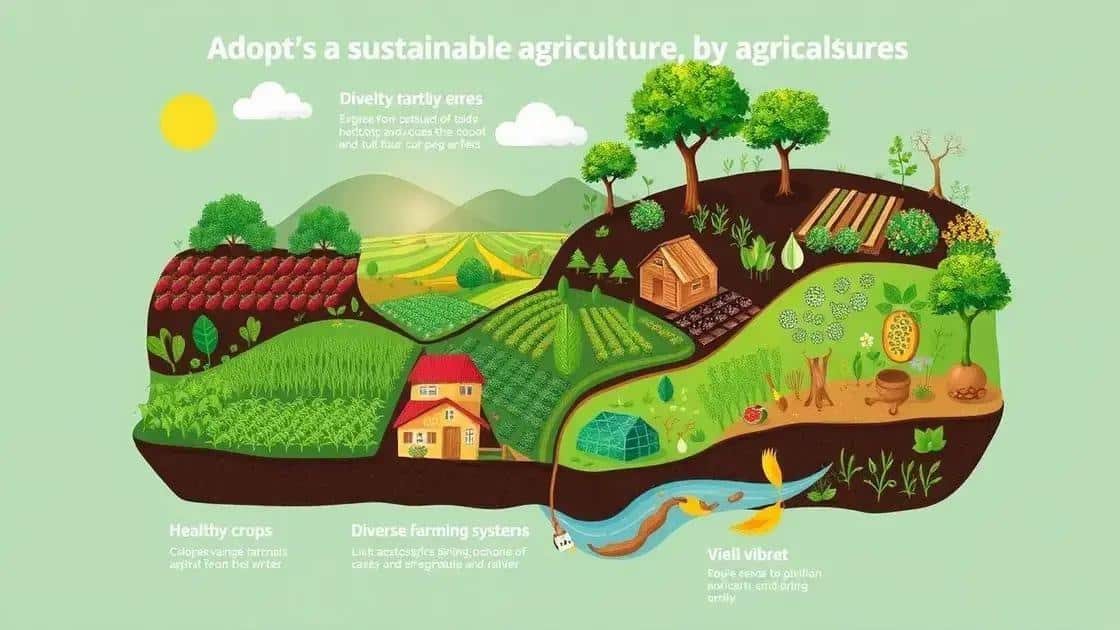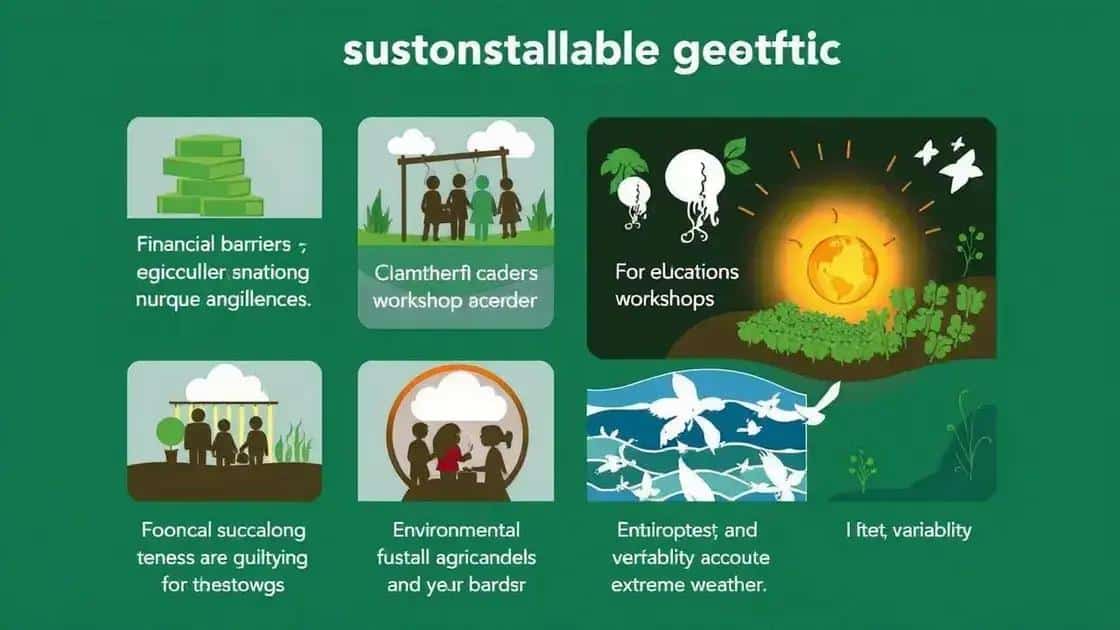Sustainable agriculture practices US: a path to better farming

Sustainable agriculture practices in the US focus on improving productivity while minimizing environmental impact through methods like crop rotation, soil conservation, and technology integration.
Sustainable agriculture practices US are becoming essential as we look for ways to grow food responsibly. But what does it really mean for farmers and consumers alike? Join me in exploring practical approaches to farming that protect the environment while maintaining productivity.
Understanding sustainable agriculture
Understanding sustainable agriculture is crucial for today’s farming practices. This approach focuses on meeting current agricultural needs without compromising the ability of future generations to meet their own. It emphasizes the importance of growing food in ways that protect the environment and enhance ecosystems.
Key Principles of Sustainable Agriculture
There are several overarching principles that guide this practice. These include minimizing environmental impact and enhancing soil health. By doing so, farmers can create a more resilient food system.
- Soil Conservation: Protects soil health through rotation and cover cropping.
- Diverse Cropping Systems: Involves planting a variety of crops to improve biodiversity.
- Water Management: Efficiently uses water resources to reduce waste and enhance crop yields.
- Pest Management: Utilizes natural predators and organic methods over chemical pesticides.
By embracing these principles, farmers can improve productivity while caring for the land. Using crop rotation and polyculture reduces dependency on chemical fertilizers, offering a more sustainable solution. Not only does this practice benefit the environment, but it also supports local communities by providing healthier food options.
The Role of Technology
Innovations play a significant role in enhancing sustainable practices. For instance, precision agriculture uses technology to monitor field variability in crops, helping farmers make better decisions. This approach leads to optimized planting, harvesting, and nutrient management.
Additionally, sustainable agriculture often integrates traditional knowledge with modern advancements. Traditions passed down through generations provide insight into local ecosystems while new technologies improve efficiency. By merging both methods, farmers can achieve sustainable outcomes while preserving their cultural heritage.
This holistic view marks a shift in how we perceive agriculture. It’s not just about producing food anymore; it’s about ensuring the planet can continue to support this production. The future of farming lies in practices that are harmonious with nature, offering a path to truly sustainable agriculture.
Benefits of adopting sustainable practices

Adopting sustainable practices in agriculture offers numerous benefits that can positively impact the environment and farming communities. These practices not only boost productivity but also ensure the long-term health of our ecosystems.
Environmental Benefits
One of the most significant advantages is the reduction of environmental impact. Farmers who embrace sustainable methods often practice soil conservation, which helps maintain soil health and prevent erosion. Healthy soil is crucial for robust crop production and can improve water retention.
- Decreased chemical runoff: Sustainable practices minimize the use of synthetic fertilizers and pesticides.
- Enhanced biodiversity: Promoting diverse crops supports various wildlife and beneficial organisms.
- Improved air quality: By reducing pollution from chemicals, the air remains cleaner for everyone.
- Carbon sequestration: Sustainable farming methods can help capture more carbon in the soil.
These environmental benefits contribute to a healthier planet and a more balanced ecosystem. Such practices, when widely adopted, lead to a collective positive impact, ensuring that natural resources are not depleted.
Economic Advantages
Beyond environmental improvements, sustainable agriculture can also lead to better economic outcomes. Farmers adopting these methods often find that they can reduce costs over time. For instance, by minimizing reliance on chemical inputs, they save money while boosting their yield potential through healthier soil.
Moreover, there is a growing consumer demand for sustainably sourced products. Farmers catering to this market can benefit from higher prices and better profit margins. Establishing a reputation for sustainable farming can also enhance community support.
Transitioning to sustainable practices may come with challenges, but long-term returns often outweigh the initial investments. Innovation in farming techniques and technologies further assists farmers in this shift.
By understanding the multilayered benefits of sustainable practices, farmers can make informed decisions that lead to a more sustainable and prosperous future.
Key strategies for effective implementation
Implementing sustainable agriculture practices effectively requires a strategic approach. Farmers need to adopt methods that are adaptable and that align with their specific environments and resources.
Assessing the Land
One of the first steps in effective implementation is conducting a thorough assessment of the land. Understanding the soil type, climate, and local ecology is essential. This information helps farmers choose the right crops and cultivation methods.
- Soil testing: Determine nutrient levels and pH to guide amendments and fertilization.
- Climate analysis: Evaluate temperature patterns and rainfall to plan planting schedules.
- Water resources: Assess availability and quality to ensure sustainable irrigation practices.
By assessing these factors, farmers can make informed decisions that will lead to better outcomes for their crops and the environment.
Crop Rotation and Diversity
Diversifying crops is another key strategy in sustainable agriculture. Crop rotation helps maintain soil fertility and reduce pest outbreaks. By rotating different types of crops, farmers disrupt the life cycles of pests and diseases.
This method not only enhances soil health but also maximizes productivity. Incorporating cover crops during the offseason can improve soil structure and prevent erosion. Additionally, this practice can provide habitat for beneficial insects that aid in pest control.
Utilizing Technology
In today’s world, technology plays a significant role in implementing sustainable practices. Farmers can use precision agriculture tools to monitor their fields and optimize inputs like water and fertilizers. This data-driven approach allows for better resource management.
For instance, sensors can detect soil moisture levels. This helps farmers water their crops only when necessary, conserving valuable resources. Drones can also map fields, providing insights into crop health and growth patterns.
By integrating technology into their practices, farmers not only enhance their efficiency but also contribute to sustainable farming solutions.
Challenges in sustainable agriculture

Despite the clear benefits, there are significant challenges in sustainable agriculture that farmers must navigate. Understanding these obstacles is crucial for effective implementation and adaptation.
Financial Constraints
One of the primary hurdles is the financial investment required to transition to sustainable practices. Many farmers face high upfront costs for new equipment and technologies. These investments can be daunting, especially for small farms operating on tight margins.
- Initial costs can prevent farmers from adopting new sustainable practices.
- Access to financing is limited for many farmers, making it difficult to upgrade infrastructure.
- Market fluctuations can impact the profitability of sustainable products.
- Longer payback periods may discourage farmers from making the switch.
These financial constraints can create a barrier to entry, preventing many farmers from pursuing sustainability.
Knowledge and Education
Another challenge lies in the lack of knowledge about sustainable methods. Many farmers are accustomed to traditional practices and may find it difficult to change their ways. Education and training are essential.
Workshops and extension services can provide valuable resources, but not all farmers have access to this information. Additionally, ongoing support is often necessary to help farmers overcome the learning curve associated with new practices.
Environmental Variability
Environmental conditions can also present substantial challenges. Factors such as climate change can impact crop yields and alter growing seasons. Farmers must adapt to unpredictable weather patterns, which can affect the success of sustainable practices.
For instance, prolonged droughts or heavy rainfall may make it challenging to implement certain techniques effectively. This variability requires farmers to remain flexible and innovative in their approaches.
Ultimately, while there are numerous challenges in sustainable agriculture, understanding and addressing these issues is key to fostering a more resilient farming future.
FAQ – Frequently Asked Questions about Sustainable Agriculture
What are the main challenges in sustainable agriculture?
The main challenges include financial constraints, lack of knowledge, environmental variability, and the need for community support.
How can farmers overcome financial barriers?
Farmers can seek grants, loans, or subsidies specifically aimed at supporting sustainable practices, making the transition more feasible.
Why is education important for sustainable farming?
Education provides farmers with essential knowledge about sustainable methods and innovations, helping them improve their practices effectively.
What role does technology play in sustainable agriculture?
Technology helps optimize resource use, improve yield monitoring, and enhance decision-making, making farming more efficient and environmentally friendly.






